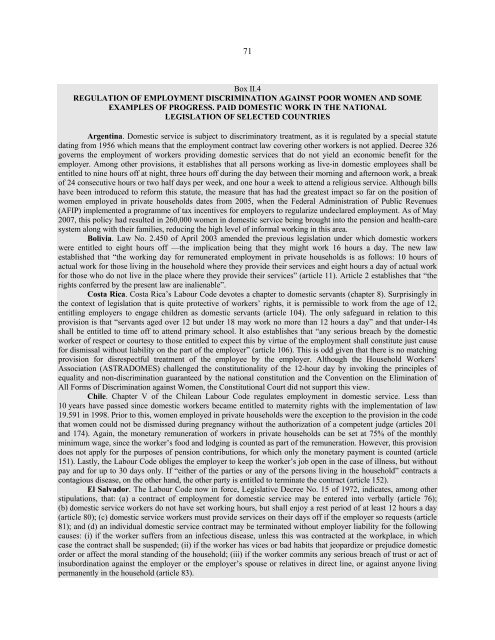Women in Latin America and the Caribbean - Cepal
Women in Latin America and the Caribbean - Cepal
Women in Latin America and the Caribbean - Cepal
You also want an ePaper? Increase the reach of your titles
YUMPU automatically turns print PDFs into web optimized ePapers that Google loves.
71<br />
Box II.4<br />
REGULATION OF EMPLOYMENT DISCRIMINATION AGAINST POOR WOMEN AND SOME<br />
EXAMPLES OF PROGRESS. PAID DOMESTIC WORK IN THE NATIONAL<br />
LEGISLATION OF SELECTED COUNTRIES<br />
Argent<strong>in</strong>a. Domestic service is subject to discrim<strong>in</strong>atory treatment, as it is regulated by a special statute<br />
dat<strong>in</strong>g from 1956 which means that <strong>the</strong> employment contract law cover<strong>in</strong>g o<strong>the</strong>r workers is not applied. Decree 326<br />
governs <strong>the</strong> employment of workers provid<strong>in</strong>g domestic services that do not yield an economic benefit for <strong>the</strong><br />
employer. Among o<strong>the</strong>r provisions, it establishes that all persons work<strong>in</strong>g as live-<strong>in</strong> domestic employees shall be<br />
entitled to n<strong>in</strong>e hours off at night, three hours off dur<strong>in</strong>g <strong>the</strong> day between <strong>the</strong>ir morn<strong>in</strong>g <strong>and</strong> afternoon work, a break<br />
of 24 consecutive hours or two half days per week, <strong>and</strong> one hour a week to attend a religious service. Although bills<br />
have been <strong>in</strong>troduced to reform this statute, <strong>the</strong> measure that has had <strong>the</strong> greatest impact so far on <strong>the</strong> position of<br />
women employed <strong>in</strong> private households dates from 2005, when <strong>the</strong> Federal Adm<strong>in</strong>istration of Public Revenues<br />
(AFIP) implemented a programme of tax <strong>in</strong>centives for employers to regularize undeclared employment. As of May<br />
2007, this policy had resulted <strong>in</strong> 260,000 women <strong>in</strong> domestic service be<strong>in</strong>g brought <strong>in</strong>to <strong>the</strong> pension <strong>and</strong> health-care<br />
system along with <strong>the</strong>ir families, reduc<strong>in</strong>g <strong>the</strong> high level of <strong>in</strong>formal work<strong>in</strong>g <strong>in</strong> this area.<br />
Bolivia. Law No. 2.450 of April 2003 amended <strong>the</strong> previous legislation under which domestic workers<br />
were entitled to eight hours off —<strong>the</strong> implication be<strong>in</strong>g that <strong>the</strong>y might work 16 hours a day. The new law<br />
established that “<strong>the</strong> work<strong>in</strong>g day for remunerated employment <strong>in</strong> private households is as follows: 10 hours of<br />
actual work for those liv<strong>in</strong>g <strong>in</strong> <strong>the</strong> household where <strong>the</strong>y provide <strong>the</strong>ir services <strong>and</strong> eight hours a day of actual work<br />
for those who do not live <strong>in</strong> <strong>the</strong> place where <strong>the</strong>y provide <strong>the</strong>ir services” (article 11). Article 2 establishes that “<strong>the</strong><br />
rights conferred by <strong>the</strong> present law are <strong>in</strong>alienable”.<br />
Costa Rica. Costa Rica’s Labour Code devotes a chapter to domestic servants (chapter 8). Surpris<strong>in</strong>gly <strong>in</strong><br />
<strong>the</strong> context of legislation that is quite protective of workers’ rights, it is permissible to work from <strong>the</strong> age of 12,<br />
entitl<strong>in</strong>g employers to engage children as domestic servants (article 104). The only safeguard <strong>in</strong> relation to this<br />
provision is that “servants aged over 12 but under 18 may work no more than 12 hours a day” <strong>and</strong> that under-14s<br />
shall be entitled to time off to attend primary school. It also establishes that “any serious breach by <strong>the</strong> domestic<br />
worker of respect or courtesy to those entitled to expect this by virtue of <strong>the</strong> employment shall constitute just cause<br />
for dismissal without liability on <strong>the</strong> part of <strong>the</strong> employer” (article 106). This is odd given that <strong>the</strong>re is no match<strong>in</strong>g<br />
provision for disrespectful treatment of <strong>the</strong> employee by <strong>the</strong> employer. Although <strong>the</strong> Household Workers’<br />
Association (ASTRADOMES) challenged <strong>the</strong> constitutionality of <strong>the</strong> 12-hour day by <strong>in</strong>vok<strong>in</strong>g <strong>the</strong> pr<strong>in</strong>ciples of<br />
equality <strong>and</strong> non-discrim<strong>in</strong>ation guaranteed by <strong>the</strong> national constitution <strong>and</strong> <strong>the</strong> Convention on <strong>the</strong> Elim<strong>in</strong>ation of<br />
All Forms of Discrim<strong>in</strong>ation aga<strong>in</strong>st <strong>Women</strong>, <strong>the</strong> Constitutional Court did not support this view.<br />
Chile. Chapter V of <strong>the</strong> Chilean Labour Code regulates employment <strong>in</strong> domestic service. Less than<br />
10 years have passed s<strong>in</strong>ce domestic workers became entitled to maternity rights with <strong>the</strong> implementation of law<br />
19.591 <strong>in</strong> 1998. Prior to this, women employed <strong>in</strong> private households were <strong>the</strong> exception to <strong>the</strong> provision <strong>in</strong> <strong>the</strong> code<br />
that women could not be dismissed dur<strong>in</strong>g pregnancy without <strong>the</strong> authorization of a competent judge (articles 201<br />
<strong>and</strong> 174). Aga<strong>in</strong>, <strong>the</strong> monetary remuneration of workers <strong>in</strong> private households can be set at 75% of <strong>the</strong> monthly<br />
m<strong>in</strong>imum wage, s<strong>in</strong>ce <strong>the</strong> worker’s food <strong>and</strong> lodg<strong>in</strong>g is counted as part of <strong>the</strong> remuneration. However, this provision<br />
does not apply for <strong>the</strong> purposes of pension contributions, for which only <strong>the</strong> monetary payment is counted (article<br />
151). Lastly, <strong>the</strong> Labour Code obliges <strong>the</strong> employer to keep <strong>the</strong> worker’s job open <strong>in</strong> <strong>the</strong> case of illness, but without<br />
pay <strong>and</strong> for up to 30 days only. If “ei<strong>the</strong>r of <strong>the</strong> parties or any of <strong>the</strong> persons liv<strong>in</strong>g <strong>in</strong> <strong>the</strong> household” contracts a<br />
contagious disease, on <strong>the</strong> o<strong>the</strong>r h<strong>and</strong>, <strong>the</strong> o<strong>the</strong>r party is entitled to term<strong>in</strong>ate <strong>the</strong> contract (article 152).<br />
El Salvador. The Labour Code now <strong>in</strong> force, Legislative Decree No. 15 of 1972, <strong>in</strong>dicates, among o<strong>the</strong>r<br />
stipulations, that: (a) a contract of employment for domestic service may be entered <strong>in</strong>to verbally (article 76);<br />
(b) domestic service workers do not have set work<strong>in</strong>g hours, but shall enjoy a rest period of at least 12 hours a day<br />
(article 80); (c) domestic service workers must provide services on <strong>the</strong>ir days off if <strong>the</strong> employer so requests (article<br />
81); <strong>and</strong> (d) an <strong>in</strong>dividual domestic service contract may be term<strong>in</strong>ated without employer liability for <strong>the</strong> follow<strong>in</strong>g<br />
causes: (i) if <strong>the</strong> worker suffers from an <strong>in</strong>fectious disease, unless this was contracted at <strong>the</strong> workplace, <strong>in</strong> which<br />
case <strong>the</strong> contract shall be suspended; (ii) if <strong>the</strong> worker has vices or bad habits that jeopardize or prejudice domestic<br />
order or affect <strong>the</strong> moral st<strong>and</strong><strong>in</strong>g of <strong>the</strong> household; (iii) if <strong>the</strong> worker commits any serious breach of trust or act of<br />
<strong>in</strong>subord<strong>in</strong>ation aga<strong>in</strong>st <strong>the</strong> employer or <strong>the</strong> employer’s spouse or relatives <strong>in</strong> direct l<strong>in</strong>e, or aga<strong>in</strong>st anyone liv<strong>in</strong>g<br />
permanently <strong>in</strong> <strong>the</strong> household (article 83).











